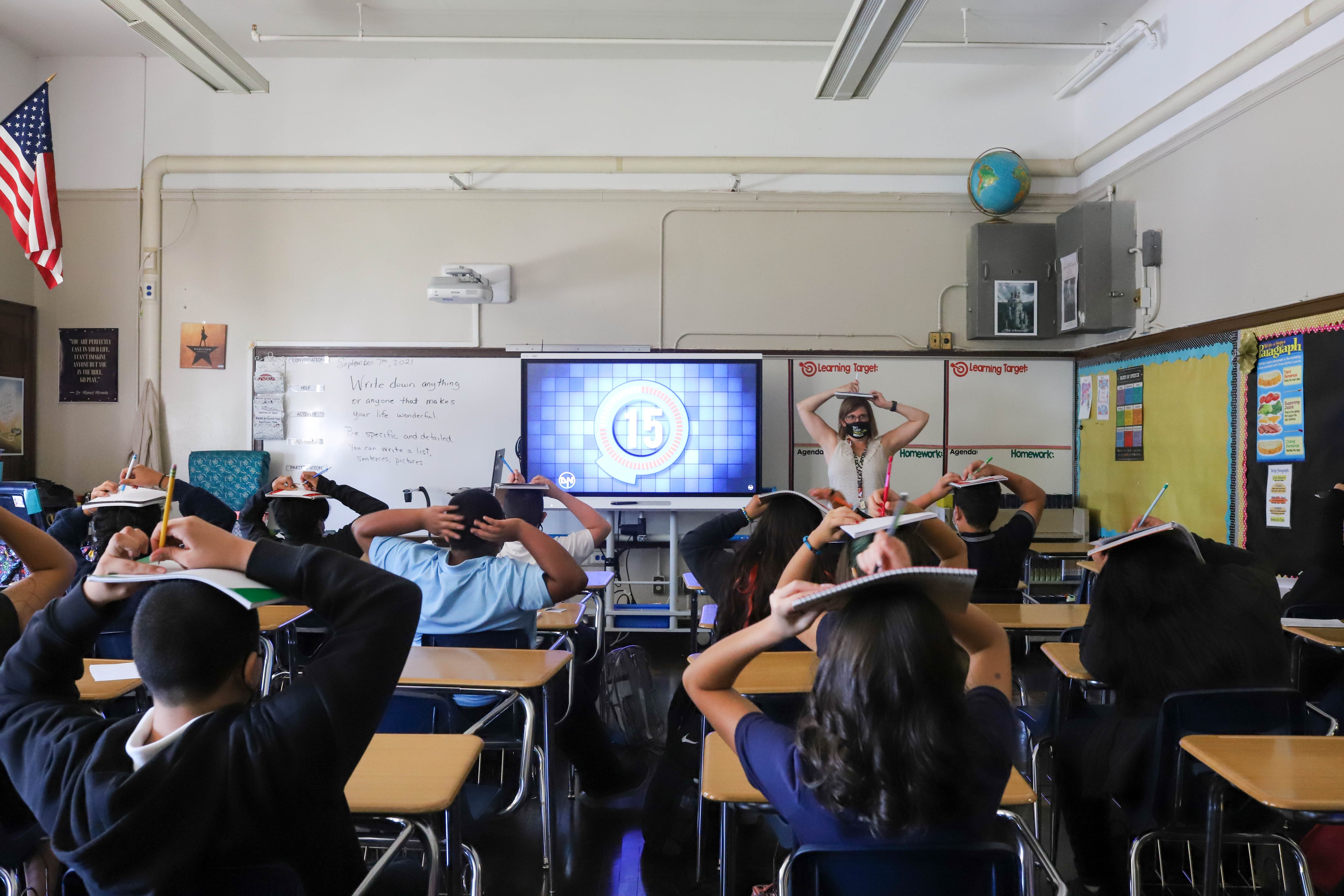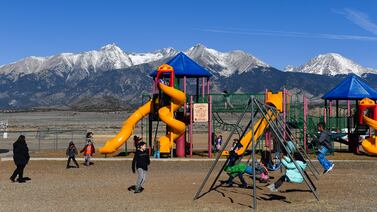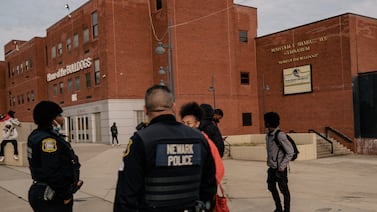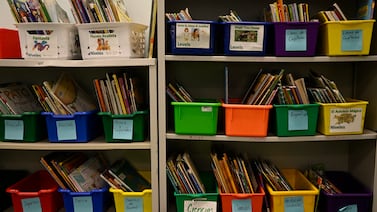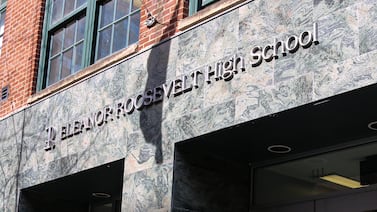School safety was top of mind for Detroit school district teachers and families who spoke during a school meeting Tuesday.
Superintendent Nikolai Vitti promised greater attention to security as the board heard calls for tighter safety standards in light of national and local incidents of weapons in schools and social media threats.
The board on Tuesday also approved a budget and a reopening plan for the 2022-23 school year.
Here’s a look at some of the major developments out of the meeting:
New and old security protocols for Detroit school buildings
Vitti spent a significant chunk of time Tuesday reviewing current safety measures and previewing new ones that the district will employ going into next school year.
Vitti said that schools will see an increase in random searches, and school buildings will be checked to ensure they have only a single point of entry.
During the public comment session, numerous teachers spoke in favor of an increase in safety measures.
Melzitta Davis, a special education teacher in the district, called for metal detectors, ID checks, and cameras in all school buildings, as well as universal safety standards.
She added that single entry points would be challenging at her school building, where some students with special needs may need to have walkers and wheelchairs.
“We cannot walk through one door. It’s not practical,” Davis said.
Tracy Thornton, a district teacher, called for the implementation of school safety committees for every school building to ensure greater staff and student input.
“The toll that has been taken on teachers the past two and a half years has been extraordinary,” Thornton said. “Having to endure COVID, social media threats and school shootings, we now wonder just how much more pain, suffering, frustration, anxiety and fear we can absorb.”
Vitti responded by saying safety plans will be revisited and teachers will be involved. He said the district would additionally crack down on students who made social media or online threats, going as far as saying a student could be removed from their school for making such threats.
Vitti last month recommended against installing metal detectors in all district schools. Roughly 80% of Detroit district schools have metal detectors, Vitti said Tuesday, and those that don’t are expected to host community meetings to determine whether or not they will have one going into next school year.
He told speakers that reviewing and implementing safety plans falls on individual school leaders, who can talk directly with parents and staff about any potential new measures.
Ultimately, the superintendent called for increased parent involvement.
“The best detection in order to prevent a tragedy in one of our schools is to have our antennas up and to be hypersensitive about what our children are saying and what are they doing,” Vitti said.
District outlines next year’s budget
The Detroit school board approved a $1.25 billion budget for the coming academic year, roughly equal to the previous year and a reflection of the federal COVID relief funds the district has been able to tap.
The infusion of federal money, plus an estimated $400 increase in per-pupil funding from the state, he added, will ensure that the district can meet the academic and operational needs it has prioritized in the past few years.
Individual schools will continue to see tutoring services, mental health support, field trips and school-based intervention to deal with learning loss caused by the pandemic.
Vitti made it clear that the district will have to prepare for the day when the COVID dollars are no longer available. Student enrollment will be a critical factor. The district currently has about 47,800 students, down from 50,400 students before the pandemic.
The district needs those numbers to rebound heading into 2023-24, when COVID relief money will be gone, especially if inflation continues to have an impact on operational costs.
A year without masks is coming
The board approved its reopening plan for the 2022-23 school year, which specifies voluntary masking for students and staff.
The district dropped an initial decision to lift its mask mandate in May in the face of strong opposition from teachers union members and a potential legal challenge. The Detroit Federation of Teachers and the district agreed last summer on safety protocols for the 2021-22 school year that included a mask requirement. That agreement ends on June 30.
Although masking will no longer be required next school year, the district is expected to continue to provide face coverings and other personal protective equipment for students and staff.
The district is actively negotiating reopening plans with various school employee unions.
Teachers stress curriculum change
As the school year draws to an end, some educators took time to decry current curriculum materials, suggesting that the district is asking teachers to use materials that most students cannot comprehend.
Donna Rickman, an algebra teacher at Henry Ford High School, called for the district to allow teachers to retool and supplement their teaching materials to make up for fundamental skills that students may lack.
“Our students have missed two years of mathematics instruction in addition to the achievement gap that was already in place,” Rickman said. “So in reality our students are reporting to ninth grade Algebra 1 as fifth graders or less, unable to do basic calculations of addition, subtraction, multiplication and division, even with the use of a calculator.”
She added: “You are basically asking us to continue to perpetuate their failure by pretending that they have the skills needed to successfully progress through the current curriculum successfully.”
The district adopted a more demanding K-12 curriculum for English language arts and math back in the 2018-19 school year, after a 2017 audit of Detroit’s curriculum found that most of the textbooks and educational materials used were not aligned to state standards. In the first year of the new curriculum, teachers described the challenges and growing pains.
Eureka Mathematics and EL Education were adopted for K-8 English and math curriculums, while Pearson (My Perspectives) and the CPM Educational Program were introduced for high school.
Lakia Wilson-Lumpkins, a district counselor and vice president of the teacher’s union, said that teachers lack the flexibility to change their English language arts curriculum.
“The curriculum is neither vibrant, imaginative, teacher friendly (nor) kid friendly, and I would be remiss if I did not add that it is not representative of our students,” Wilson-Lumpkins said. “We want what’s best for our children, and this curriculum is not it.”
Vitti responded that the district’s current curriculum choices are intentional and necessary, but said he is open to further conversations among district officials or at the individual school level to determine how teachers can reteach material and foundational skills during the school year.
“I have no doubt that our curriculum is more challenging for our students and for our teachers to teach, because it requires you to teach at grade level, and we all know that many of our students are not at grade level,” Vitti said.
“But what we cannot do is go back to where we were where we teach materials that are below grade level. Yes, it’s easier for students. Yes, it’s even easier for teachers at times,” he said. “But we put our students at an immediate disadvantage when we teach below the standard that grade level asks us to teach.”
Ethan Bakuli is a reporter for Chalkbeat Detroit covering Detroit Public Schools Community District. Contact Ethan at ebakuli@chalkbeat.org.


